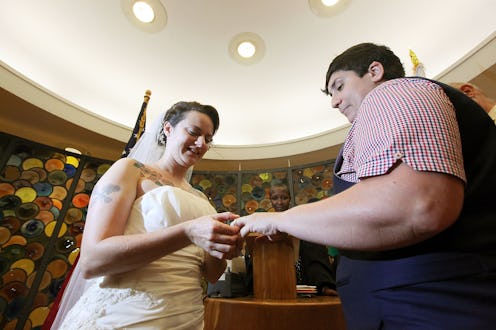Life
Do Butch or Femme Lesbians Have it Harder?
Slate recently discussed whether butch or femme lesbians have it easier in this big, bad world that's pretty unfriendly to all lesbians in general. The writer argues femmes are more susceptible to sexism and butches are more susceptible to homophobia, both of which suck a lot, but eventually concludes that since butch women get a certain kind of male privilege in a society that values males and masculinity more than females and femininity, femmes get the shorter end of the acceptance stick.
While this discussion certainly has some valid points, it's worth mentioning that no matter what kind of lesbian you are (and, by the way, there exist lesbians who don't fall within butch or femme categories), you're going to face some form of oppression no matter what. Sure, there are certain things that have the potential to be easier for femmes, like "passing" as straight and therefore avoiding homophobia, and there exist things that have the potential to be easier for butches, like not being objectified as frequently by cat-callers and men. But the fact of the matter is that butches, femmes, and any other queer woman will face oppression no matter what. Do we really have to make it a competition? Besides mild interest that could be provoked by the topic, does investigating this issue actually do anything productive?
Don't get me wrong, I'm not trying to say that there aren't unique problems that come from each type of presentation and identity. Problems I've had as a femme-identified lesbian women certainly include cat-calling, invisibility within lesbian and queer communities, constantly having to come out, and facing skepticism each time, and being labeled bisexual because I "look like a straight girl." I dated a girl for a few years who sometimes presented in a little more of a masculine way, and would face being misgendered and had to deal with homophobic micro-aggressions, neither of which I experienced because of my femme-presentation. The problems we faced were unique, but the reality was that we both faced some problem or another that a straight woman wouldn't.
The general "who has it worse" or "who has it better" game doesn't really do much to advance discussions of oppression, and it is a slippery slope that could lead to undermining experiences minorities have. While there may be a statistical hierarchy of oppression that comes with comparing, for example, a straight hispanic woman and a queer black woman, it's important to not generalize that one group has it better than another, because the factors could highly vary based on all sorts of external forces like location and community, family support, job, income, etc. A femme lesbian could possibly "have it easier" in an urban setting whereas a butch lesbian could possibly have it easier in a rural setting, but that shouldn't undermine the challenges these groups of people could face under vastly different circumstances.
